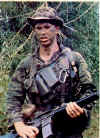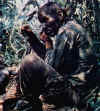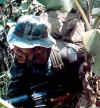| This article was published in the 101st
Division Magazine in 1970.
Click on photos to enlarge. |
L Company, 75th Infantry Rangers
by SP4 David L. Volk
The "Huey" helicopter inches down onto the small landing zone and from their concealment along the tree line, a small group of men make a running break for the chopper. This has got to be fast.
As the last figure scrambles aboard the bird a shout of "get the hell outta' here" rings over the pilot's headset and in an instant the chopper is airborne. Once aloft, the men sit and relax, the first chance they've had in five long days. Another mission has been completed and to members of a Ranger team from Company L, 75th Infantry, that means a shower and hot chow.
Hopefully it will also be a time to catch up on those letters which should have been answered over a week ago-and a time to just relax: Perhaps there will even be time to rest and collect one's thoughts of loved ones.
These are not ordinary soldiers and the war they fight is not a war known to most infantrymen in the Republic of Vietnam. Theirs is a lonely war and hopefully a quiet one.
A Ranger is a member of a small reconnaissance team where his endless hours of training and the trust of his buddies dominate his environment. When a team is inserted into the triple canopy jungle far removed from any Allied support, a Ranger is totally dependent on his own abilities to remain undetected and complete his mission. His best weapon is concealment and the tools of his trade are stealth, silence and an alert eye for the enemy.
The five days these Rangers have just spent in the jungle were trying. But by correctly implementing their special training and through careful planning and advance work, the mission was successfully completed.
Days prior to a mission, division intelligence begins to sort and classify data which has been gathered on suspected enemy movement and activity. It will then be the job of the Rangers to go out to the specified area and try to confirm or deny what is only suspected in the rear.
There is also much to be done by a Ranger himself. His equipment must be in top shape and ready to go. The rucksack alone that a Ranger carries takes approximately four hours to pack. Everything must be precisely planned and executed. In an area where he is always outnumbered and a long distance from reinforcements, the slightest mistake could be disastrous.
Rangers, however, do not make many mistakes. They have gone through rigorous training for their jobs. Many have attended the Ranger School at Fort Benning, Ga., while others have received training at the 5th Special Forces Group Recondo School located in Nha Trang, RVN.
Another thing about Rangers is that they like their work. Becoming a Ranger is strictly voluntary and there is no commitment to stay.
Members of Company L expressed a wide variety of reasons for volunteering to become a Ranger.
"I just feel safer," said SFC Jose Mendoza, Columbus, Ga. "In a line unit there is just too much noise and I like the idea of knowing where the enemy is instead of the other way around."
One of the most common reasons conveyed was the personal satisfaction a Ranger gets out of his job.
To a Ranger, the first two hours after insertion are the most dangerous and mentally straining. "Because we have to be brought in by helicopter," said Mendoza, "the enemy will know there is activity in the area." "But we have different techniques when we hit the ground that can throw the enemy off," he continued. "Also, the pilots stay as close to the ground as possible when bringing us in to lessen the chances of enemy detection."
Once inserted into suspected enemy territory, the Ranger team's primary mission is to perform reconnaissance of the area and observe the enemy. By close observation of an enemy force, valuable information can be obtained pertaining to a unit's size, movement and capabilities.
Usually its mission is not to make physical contact with the enemy. However, sometimes it cannot be avoided. More than one unsuspecting enemy soldier has had his day ruined by the deafening blast of a Ranger's claymore mine.
Although a Ranger has disadvantages operating far from friendly basecamps and firebases, he also has many things going for him. A sophisticated relay system provides a Ranger with good communications with rear areas despite his remote location. Another distinct advantage expressed by many Rangers is the close-in support of the 2nd Squadron (Airmobile), 17th Cavalry.
"Our support is instantaneous from the 2/17th Cavalry," said a Ranger lieutenant, "and there is no such thing as bad weather to the Cav. If we have people who need to get out in a hurry, the Cav is there with the birds."
'There have been times," said 1LT Kevin J. Henry of Arlington, Va., "when Cobras have spotted one of our ambushes and remained in the area waiting for us to call if we need help. It's a great feeling when you're way-the-hell out there with a strong possibility of enemy troops all around and you look up and see a couple of Cobras flying overhead."
As the helicopter carrying the extracted Ranger team approaches its helipad at Camp Eagle, another group of fully-equipped Rangers comes into view waiting and resting on the edge of the pad. They are also relaxing and thinking. much the same as the men on the incoming chopper, but their thoughts are far from better days and hot chow. They are deeply involved with the mission which they are about to begin.
The sound of the approaching helicopter brings the men on the helipad back to reality and onto their feet. Inside the chopper the small group of men in tiger fatigues and camouflage stick-blackened faces are joking and enjoying their first cigarette in five days.
As the bird sets down, the returning Rangers disembark while the men of the team on the pad begin getting their rucksacks ready for take off. As the two groups pass there are "thumbs-up" signals and wishes of good luck.
As the returnees hurry for the mess hall or the showers, the team about to be inserted boards the helicopter to leave for its next mission.
Although there is a slight air of uncertainty as to what the outcome of this mission will be, Rangers of Company L, 75th Infantry, wouldn't have it any other way.





